Survey Details
 About the Survey
About the Survey
Report Authors
- Jeffrey Lyons, Director of Survey Research, School of Public Service
- Matthew May, Senior Research Associate, Idaho Policy Institute
The Sixth Annual Idaho Public Policy Survey was conducted November 29th–December 3rd, 2020, and surveyed 1,000 adults over the age of 18 who currently live in Idaho.
The sample is designed to be representative of the population of the state both geographically and demographically. This was a mixed-mode survey which contacted by phone (58%), online (32%), and via text message (10%). The goal of using multiple means to contact respondents is to increase our coverage of the population to people who may not respond to traditional phone surveys.
The survey addresses a variety of issues facing Idaho including growth, education, taxes, and criminal justice, but this brief will focus on attitudes regarding the COVID-19 pandemic.
The survey has a simple random sampling margin of error of +/- 3.1% and was conducted by GS Strategy Group.
Key Findings
- A narrow majority (55%) of Idahoans report that they would get a vaccine for COVID-19 if one were available today, while a sizeable minority (38%) state that they would not get the vaccine.
- Among those who would not get a vaccine if it were available, the most common reasons are concern about side effects (45%), not believing that they need it (27%), and wanting to know more about its effectiveness (23%).
- A majority (58%) support a face mask mandate in public spaces, while a sizeable minority (41%) oppose such a measure. If the mandate were to be enforceable by a fine, support falls to become evenly split and within the margin of error (51% support, 46% oppose).
Personal Experiences
Before looking at attitudes about COVID-19, we asked respondents about their personal experiences with the virus. 8% of the respondents in our survey report having tested positive for COVID-19, a figure that is similar to the percentage of Idahoans who had tested positive in the state. A larger number of respondents (15%) report that while they did not test positive, they believe that they have had COVID-19. The vast majority of Idahoans (77%) report not having had COVID-19.
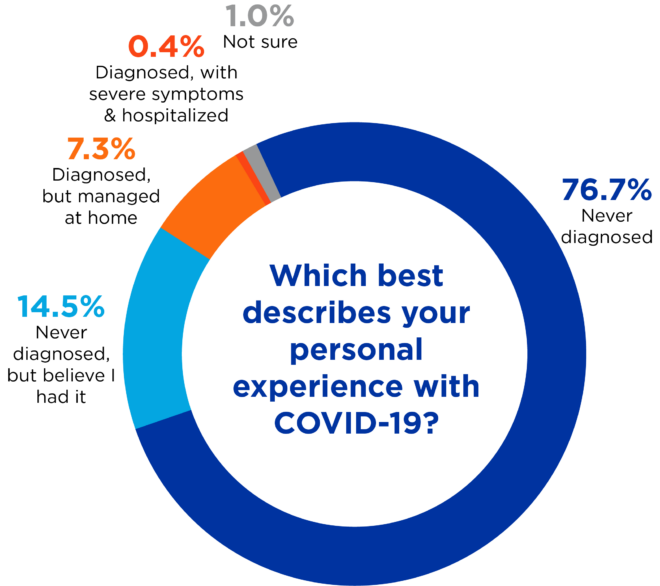
While relatively few have actually had COVID-19 themselves, the majority of people in our sample reported having friends and family who have tested positive for COVID-19. Almost half (44%) have 1-5 friends or family members who have been diagnosed, 16% have 6-10 friends or family members who have tested positive, and 14% report more than 10 have been diagnosed. Only 26% of people in the state report that they do not have any friends or family who have tested positive.
In addition to people’s experience with the virus itself, the pandemic has had wide ranging health impacts in other areas. To that end, we asked how many days in the past week people had felt anxious or stressed due to COVID-19. We find that Idahoans are largely split, with a large minority (47%) reporting no stress or anxiety related to the pandemic, and half of the state (50%) reporting that they had felt anxious or stressed at least one day in the past week. 20% felt anxious or stressed 1-2 days in the past week, 13% felt anxious or stressed 3-4 days in the past week, and 17% felt anxious or stressed 5-7 days in the past week.
Attitudes
Turning to attitudes about the pandemic, we wanted to know what was the most concerning to people. While there are undoubtedly a large number of considerations and concerns, we presented people with three options that were a large part of the conversations occurring at the time the survey was in the field – negative impacts on the economy, negative impacts on health, and negative impacts on children’s education.
OVERALL CONCERN
We find that people are divided on the most concerning elements of the pandemic, with the largest number (38%) listing the economic impacts as their primary concern, followed by the impacts on children’s education (31%), and health impacts (28%).
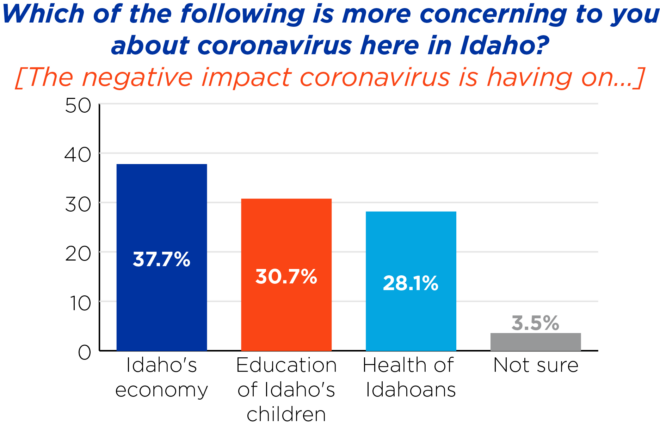
There are sizeable differences by political party on this issue, with Republicans being more likely than Democrats to be most concerned about the economy (46% of Republicans and 21% of Democrats) and effects on education (37% of Republicans and 23% of Democrats). More Democrats were concerned about health impacts of the virus than Republicans (52% of Democrats selected this option and 13% of Republicans).
EDUCATION
Focusing on attitudes about schools, we asked people how they thought schools in their area should be operating between three options – all in-person, all online, and a mix of the two. We find that the most common response (43%) was that schools should be offering a mix of both online and in-person learning, with smaller groups opting for all in-person (33%) or all online (20%). Republicans were more likely to prefer in-person learning (50%) than a mix (36%) or all online classes (8%), and Democrats showed a preference for a mix of in-person and online (46%) as opposed to all online (37%) or all in-person (10%). Further, we find that parents of children in K-12 schools are split between all in-person learning (42%) and a mix of in-person and online (38%), with relatively few (16%) preferring all online.

POLICY
Looking to attitudes about policy, we focused on support for a statewide mask mandate, and support for a mask mandate that would be punishable by a fine. To do this, we split our sample of 1,000 respondents randomly into two groups, and ask slightly different versions of the question to each group. Our baseline group was asked whether they would support or oppose the state “making it mandatory to wear masks in public spaces to fight the coronavirus pandemic?” The other group was asked the same question, but with “where not wearing a mask could be punishable by a fine?” added to the question. By posing these two questions, we are able to assess general support for a mask mandate, and also support for a mandate that allows for one type of enforcement.
We find that Idahoans express majority support (58%) for a statewide law requiring masks in public places, with a sizeable minority (41%) in opposition. It is also worth noting that there are high levels of intensity in these attitudes – 46% “strongly” support a mandate, and 32% “strongly” oppose it, with relatively few stating that they “somewhat” support or oppose. Large differences by political party emerge, with 93% of Democrats supporting a mask mandate and 7% opposing, while only 39% of Republicans are in favor compared to 59% in opposition.
When we turn to the version of the question that included a provision for enforcing the mandate with a fine, we find that support falls, and opposition increases. A slight majority (51%) report supporting a mandate enforceable with a fine, and large minority (46%) oppose it. The difference between these numbers is within our margin of error, so we are unable to say if more people support or oppose a mandate that is enforceable with a fine. Support falls among all party affiliations, but Democrats remain overwhelmingly supportive of a mandate while Republicans become even more opposed. 92% of Democrats support the mandate that is enforceable by a fine and 7% oppose it, while only 26% of Republicans support such a measure and 71% oppose it.
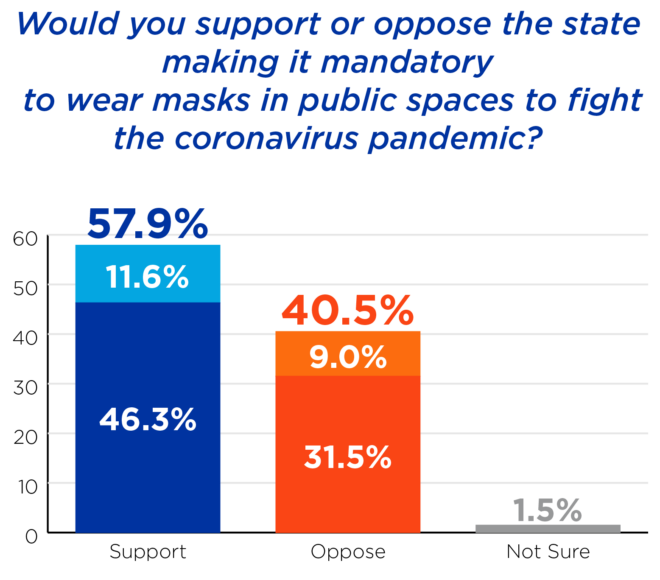
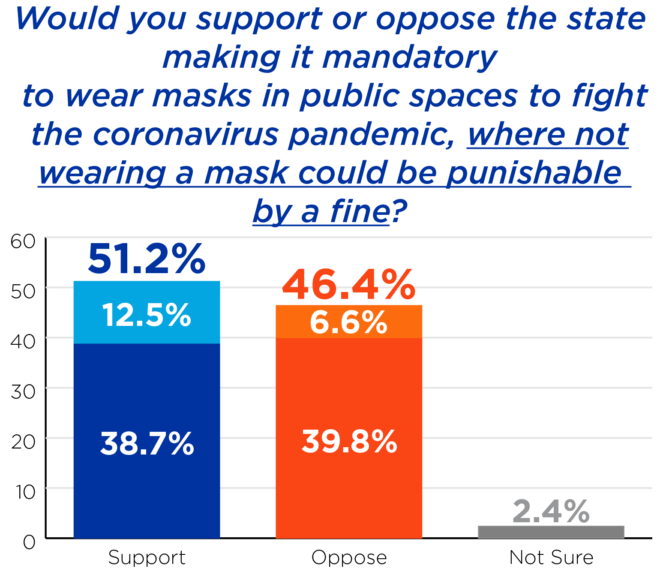
VACCINATION
Finally, we turn to attitudes about a COVID-19 vaccine, focusing on whether people would get a vaccine if it were available today. For context, we want to note that this survey was in field after Pfizer and Moderna announced their vaccines were highly effective, and before the FDA approved either vaccine for use by the public. We find that a majority (55%) report that they would either definitely or probably get the vaccine, with 38% stating that they would definitely or probably not get the vaccine.
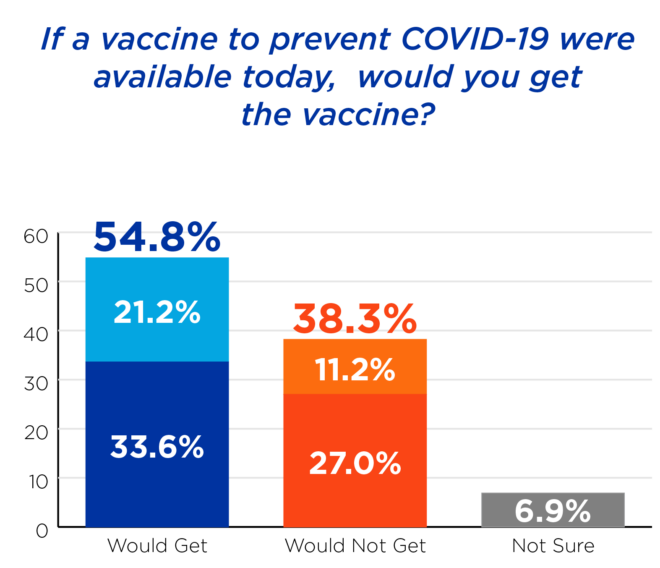
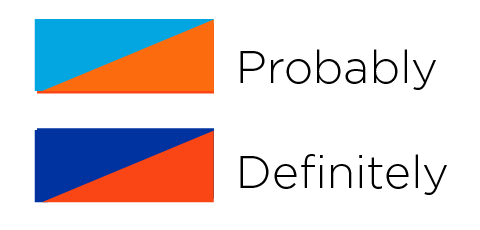
These numbers are similar to what national polling indicates are the sentiments throughout the country. A Pew Research Center survey done in mid-November of 2020 with identical question wording found that 60% of Americans would get the vaccine and 39% would not. Party identification is again one of the most influential factors dividing views on the matter, with 77% of Democrats saying that they would get the vaccine, and 45% of Republicans indicating that they would. Older Idahoans were somewhat more likely to indicate that they would get the vaccine than younger Idahoans (65% of those over the age of 65 compared to 55% of those from 18-39).
Those who responded that they would definitely or probably not get the vaccine were asked a follow-up question about what the biggest reason was that they did not plan on getting the vaccine. Respondents were split, with concern for side effects being the common response (45%), followed by those who do not believe they need it (27%), and those who want to know more about its effectiveness (23%). Only 2% of respondents cited that it would cost too much.

Conclusion
In sum, there is a healthy degree of division in how people across the state view the pandemic. There is majority support for a mask mandate without enforcement, but when people are asked about a mandate that is enforceable with a fine, the public is divided. A narrow majority indicate they would take a COVID-19 vaccine if it were available today, but there are a large number of people who do not think they would do so. As with most elements of public opinion in the United States today, partisanship is by far the most important individual-level factor that drives attitudes on the pandemic.
Endnotes
- As of December 3rd (the last day our survey was in the field), the state of Idaho’s COVID-19 Data Dashboard reports that there had been 106,455 cumulative cases in the state. The U.S. Census Bureau estimates Idaho’s 2019 population at 1,787,065. Roughly 6% of Idaho’s population had tested positive by the time the survey was in the field.
- Funk, Cary, and Alec Tyson. “Intent to Get COVID-19 Vaccine Rises to 60% as Confidence in Research and Development Process Increases.” Pew Research Center. Some more recent polling such as the NBC News/Ipsos survey done after the FDA approval of the Pfizer vaccine indicates that intentions to get the vaccine may be rising in national samples.